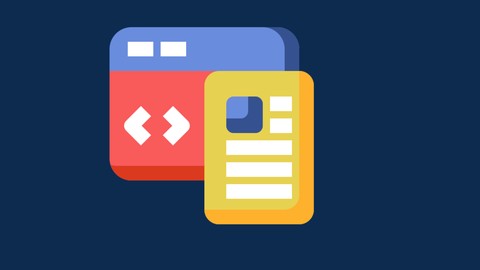
Mastering Flask: Building a Secure Trivia Quiz Application
Mastering Flask: Building a Secure Trivia Quiz Application, available at $54.99, with 64 lectures, 1 quizzes, and has 2 subscribers.
You will learn about Understand Flask Basics: Learn the fundamental concepts of Flask, including routes, templates, and server setup. Environment Setup: Configure the development environment for a Flask application using virtual environments. Implement User Authentication: Set up user authentication and authorization using Firebase. Secure Application with Environment Variables: Use environment variables to secure sensitive information like API keys Handle User Sessions: Manage user sessions to keep track of logged-in users across multiple pages. Flask Form Handling: Create and process web forms using Flask-WTF to handle user registrations and logins. Data Validation with WTForms: Implement form validation to ensure that users input valid data. Integrate Third-Party APIs: Fetch data from external APIs, specifically the Open Trivia Database API. JSON Data Handling: Parse and manipulate JSON data received from external APIs. Dynamic Template Generation: Use Jinja templates to dynamically generate HTML content based on backend data. Bootstrap Integration: Incorporate Bootstrap for responsive design and to enhance the UI/UX of the application. Database Management with Firebase: Utilize Firebase for storing and retrieving user data securely. User Registration and Login Flows: Develop complete registration and login workflows, including error handling and user feedback. Password Management: Implement secure password handling processes, including password reset functionality. Flask Application Structure: Understand and implement a proper project structure for scalability and maintenance. Debugging Flask Applications: Learn techniques to identify and fix bugs in a Flask application. Deploying Flask Applications: Explore options for deploying Flask applications to different hosting environments. Flask Security Best Practices: Apply security best practices to protect the web application from common vulnerabilities. Session Management: Implement robust session management to handle user states securely. Conditional Rendering in Templates: Use Jinja conditional statements to control the flow of information in templates. State Management Across Requests: Manage application state across multiple user requests. Progress Tracking in Quiz Applications: Develop mechanisms to track and display user progress throughout the quiz. Dynamic Question Generation: Implement logic to fetch and display new questions based on user responses. Implementing CSRF Protection: Apply CSRF protection to secure forms against cross-site request forgery attacks. Use of AJAX in Flask: Enhance user experience by using AJAX to fetch data without reloading the web page. Implementing Flash Messages: Use Flask's flashing system to provide feedback to users after actions. This course is ideal for individuals who are Beginners who are new to web development and Flask. or Beginners in web development who want to learn how to build interactive web applications. or Python developers interested in expanding their skillset to include web development with Flask. or Students or professionals looking to enhance their knowledge of backend web development. or Entrepreneurs or startup founders aiming to develop their own web applications. or Freelancers seeking to offer Flask web development services to clients. or Anyone interested in creating dynamic and interactive web applications using Python and Flask. or ndividuals looking to add practical projects to their portfolio for job applications or freelance opportunities. or Web developers transitioning from other frameworks to Flask and seeking comprehensive guidance. or Intermediate developers seeking to enhance their skills in Flask and learn more about security practices. or Professionals looking for practical experience in building and deploying secure web applications with Flask. It is particularly useful for Beginners who are new to web development and Flask. or Beginners in web development who want to learn how to build interactive web applications. or Python developers interested in expanding their skillset to include web development with Flask. or Students or professionals looking to enhance their knowledge of backend web development. or Entrepreneurs or startup founders aiming to develop their own web applications. or Freelancers seeking to offer Flask web development services to clients. or Anyone interested in creating dynamic and interactive web applications using Python and Flask. or ndividuals looking to add practical projects to their portfolio for job applications or freelance opportunities. or Web developers transitioning from other frameworks to Flask and seeking comprehensive guidance. or Intermediate developers seeking to enhance their skills in Flask and learn more about security practices. or Professionals looking for practical experience in building and deploying secure web applications with Flask.
Enroll now: Mastering Flask: Building a Secure Trivia Quiz Application
Summary
Title: Mastering Flask: Building a Secure Trivia Quiz Application
Price: $54.99
Number of Lectures: 64
Number of Quizzes: 1
Number of Published Lectures: 64
Number of Published Quizzes: 1
Number of Curriculum Items: 65
Number of Published Curriculum Objects: 65
Original Price: $59.99
Quality Status: approved
Status: Live
What You Will Learn
- Understand Flask Basics: Learn the fundamental concepts of Flask, including routes, templates, and server setup.
- Environment Setup: Configure the development environment for a Flask application using virtual environments.
- Implement User Authentication: Set up user authentication and authorization using Firebase.
- Secure Application with Environment Variables: Use environment variables to secure sensitive information like API keys
- Handle User Sessions: Manage user sessions to keep track of logged-in users across multiple pages.
- Flask Form Handling: Create and process web forms using Flask-WTF to handle user registrations and logins.
- Data Validation with WTForms: Implement form validation to ensure that users input valid data.
- Integrate Third-Party APIs: Fetch data from external APIs, specifically the Open Trivia Database API.
- JSON Data Handling: Parse and manipulate JSON data received from external APIs.
- Dynamic Template Generation: Use Jinja templates to dynamically generate HTML content based on backend data.
- Bootstrap Integration: Incorporate Bootstrap for responsive design and to enhance the UI/UX of the application.
- Database Management with Firebase: Utilize Firebase for storing and retrieving user data securely.
- User Registration and Login Flows: Develop complete registration and login workflows, including error handling and user feedback.
- Password Management: Implement secure password handling processes, including password reset functionality.
- Flask Application Structure: Understand and implement a proper project structure for scalability and maintenance.
- Debugging Flask Applications: Learn techniques to identify and fix bugs in a Flask application.
- Deploying Flask Applications: Explore options for deploying Flask applications to different hosting environments.
- Flask Security Best Practices: Apply security best practices to protect the web application from common vulnerabilities.
- Session Management: Implement robust session management to handle user states securely.
- Conditional Rendering in Templates: Use Jinja conditional statements to control the flow of information in templates.
- State Management Across Requests: Manage application state across multiple user requests.
- Progress Tracking in Quiz Applications: Develop mechanisms to track and display user progress throughout the quiz.
- Dynamic Question Generation: Implement logic to fetch and display new questions based on user responses.
- Implementing CSRF Protection: Apply CSRF protection to secure forms against cross-site request forgery attacks.
- Use of AJAX in Flask: Enhance user experience by using AJAX to fetch data without reloading the web page.
- Implementing Flash Messages: Use Flask's flashing system to provide feedback to users after actions.
Who Should Attend
- Beginners who are new to web development and Flask.
- Beginners in web development who want to learn how to build interactive web applications.
- Python developers interested in expanding their skillset to include web development with Flask.
- Students or professionals looking to enhance their knowledge of backend web development.
- Entrepreneurs or startup founders aiming to develop their own web applications.
- Freelancers seeking to offer Flask web development services to clients.
- Anyone interested in creating dynamic and interactive web applications using Python and Flask.
- ndividuals looking to add practical projects to their portfolio for job applications or freelance opportunities.
- Web developers transitioning from other frameworks to Flask and seeking comprehensive guidance.
- Intermediate developers seeking to enhance their skills in Flask and learn more about security practices.
- Professionals looking for practical experience in building and deploying secure web applications with Flask.
Target Audiences
- Beginners who are new to web development and Flask.
- Beginners in web development who want to learn how to build interactive web applications.
- Python developers interested in expanding their skillset to include web development with Flask.
- Students or professionals looking to enhance their knowledge of backend web development.
- Entrepreneurs or startup founders aiming to develop their own web applications.
- Freelancers seeking to offer Flask web development services to clients.
- Anyone interested in creating dynamic and interactive web applications using Python and Flask.
- ndividuals looking to add practical projects to their portfolio for job applications or freelance opportunities.
- Web developers transitioning from other frameworks to Flask and seeking comprehensive guidance.
- Intermediate developers seeking to enhance their skills in Flask and learn more about security practices.
- Professionals looking for practical experience in building and deploying secure web applications with Flask.
Welcome to “Mastering Flask: Building a Secure Trivia Quiz Application,” an immersive and practical course designed for developers looking to deepen their understanding of web application development using Flask, Firebase, and other integral web technologies. This course offers a hands-on approach to learning, ideal for both beginners and experienced developers eager to expand their skill set in Python web development and secure application design.
What You Will Learn
Throughout this course, participants will embark on the journey of creating a complete trivia quiz application from scratch. This application will not only serve as a functional and interactive web platform but also incorporate essential security measures to safeguard user data and system integrity.
Key Topics Include:
-
Flask Framework Basics: Dive into Flask setup, routing, request handling, and responses. Understand the Flask application structure and its working environment.
-
User Authentication and Authorization: Learn to integrate Firebase for handling user authentication, enabling a secure system where users can register, log in, and manage their sessions.
-
Form Processing with Flask-WTF: Gain proficiency in handling forms securely with Flask-WTF, implementing data validation and CSRF protection to ensure robust backend logic.
-
Interacting with APIs: Fetch and process data dynamically using the Open Trivia Database API. Learn to handle JSON data effectively to integrate external content into your Flask application.
-
Front-end Design using Bootstrap: Implement Bootstrap to create responsive and visually appealing interfaces that provide a seamless user experience across different devices and screen sizes.
-
Deployment: learn how to prepare a Flask application for production, covering common issues like scalability and security.
-
Best Practices in Security: Address potential security pitfalls by implementing best practices such as environment variable management, secure session handling, and advanced authentication techniques.
Learning Outcomes
By the end of this course, you will be able to:
-
Develop a fully functional web application using Flask.
-
Integrate third-party services like Firebase and external APIs into your Flask applications.
-
Manage user authentication and maintain secure sessions.
-
Handle form data securely with validations and protections against common vulnerabilities.
-
Deploy a Flask application to a cloud hosting service, ready for real-world use.
-
Apply best practices in web security to safeguard your applications against threats.
Course Structure
This course is structured to guide you through the development process step-by-step, with each module focusing on different aspects of the application. The content is divided into practical sections, each culminating in a task or project component where you apply what you’ve learned.
Who This Course is For
“Mastering Flask: Building a Secure Trivia Quiz Application” is suitable for:
-
Beginners who are new to web development and Flask.
-
Intermediate developers seeking to enhance their skills in Flask and learn more about security practices.
-
Professionals looking for practical experience in building and deploying secure web applications with Flask.
Enroll Now
Join us to transform your understanding of web development using Flask and take your skills to the next level. Whether you’re starting your development journey or looking to upgrade your existing projects, this course provides the tools and knowledge needed to succeed in the ever-evolving landscape of web technology.
Course Curriculum
Chapter 1: Environment Setup
Lecture 1: Introduction
Lecture 2: What is an API
Lecture 3: What is an API Client
Lecture 4: What is Python
Lecture 5: Python Installation on Windows
Lecture 6: What are virtual environments
Lecture 7: Creating and activating a virtual environment on Windows
Lecture 8: Python Installation on macOS
Lecture 9: Creating and activating a virtual environment on macOS
Lecture 10: What is Flask
Lecture 11: Installing Flask
Lecture 12: Installing Visual Studio Code
Chapter 2: Building an API Client
Lecture 1: Creating a minimal flask app
Lecture 2: How to run a flask app
Lecture 3: Http and Http Methods
Lecture 4: Session Cookies
Lecture 5: Making an API Call
Lecture 6: Adding a secret key to flask app
Lecture 7: Environment Variables
Lecture 8: Creating the logic part 1
Lecture 9: Creating the logic part 2
Lecture 10: Creating the logic part 3
Lecture 11: Creating templates
Lecture 12: Testing the app
Lecture 13: What is Firebase
Lecture 14: Setting up firebase for authentication
Lecture 15: Firebase Integration
Lecture 16: Form integration
Lecture 17: Implementing the registration form logic
Lecture 18: Implementing the login form logic
Lecture 19: Implementing the logout logic
Lecture 20: Implementing password reset logic
Lecture 21: Creating a home route
Lecture 22: Creating an authentication function
Lecture 23: Creating a base template
Lecture 24: Refactoring existing templates
Lecture 25: Creating the home template
Lecture 26: Creating the registration template
Lecture 27: Creating the login template
Lecture 28: Creating a Password reset template
Lecture 29: Protecting Routes
Lecture 30: Firebase configuration checks
Lecture 31: Testing app authentication process
Lecture 32: Project Code project code
Chapter 3: Backing up your data to the cloud
Lecture 1: Using Git for version control
Lecture 2: Git installation
Lecture 3: Git configuration
Lecture 4: Git Terminology
Lecture 5: Initialize app with git repository
Lecture 6: Creating a gitignore file
Lecture 7: Adding files to local repository
Lecture 8: What is Github
Lecture 9: Create a Github account
Lecture 10: Creating a personal access token for Github
Lecture 11: Backing up local repository to Github
Chapter 4: Deploying your app to the cloud
Lecture 1: Exploring deployment and hosting options
Lecture 2: Preparing app for cloud deployment
Lecture 3: Create a new account on pythonanywhere
Lecture 4: Creating a new web app in Pythonanywhere
Lecture 5: Uploading project files to Pythonanywhere
Lecture 6: Creating and activating a virtual environment on Pythonanywhere
Lecture 7: What is a WSGI File
Lecture 8: Configuring WSGI File
Lecture 9: Running your app in a cloud hosting environment
Chapter 5: Quiz : Test your knowledge
Instructors
-
Bluelime Learning Solutions
Making Learning Simple
Rating Distribution
- 1 stars: 0 votes
- 2 stars: 0 votes
- 3 stars: 0 votes
- 4 stars: 0 votes
- 5 stars: 0 votes
Frequently Asked Questions
How long do I have access to the course materials?
You can view and review the lecture materials indefinitely, like an on-demand channel.
Can I take my courses with me wherever I go?
Definitely! If you have an internet connection, courses on Udemy are available on any device at any time. If you don’t have an internet connection, some instructors also let their students download course lectures. That’s up to the instructor though, so make sure you get on their good side!
You may also like
- Top 10 Content Creation Courses to Learn in December 2024
- Top 10 Game Development Courses to Learn in December 2024
- Top 10 Software Testing Courses to Learn in December 2024
- Top 10 Big Data Courses to Learn in December 2024
- Top 10 Internet Of Things Courses to Learn in December 2024
- Top 10 Quantum Computing Courses to Learn in December 2024
- Top 10 Cloud Computing Courses to Learn in December 2024
- Top 10 3d Modeling Courses to Learn in December 2024
- Top 10 Mobile App Development Courses to Learn in December 2024
- Top 10 Graphic Design Courses to Learn in December 2024
- Top 10 Videography Courses to Learn in December 2024
- Top 10 Photography Courses to Learn in December 2024
- Top 10 Language Learning Courses to Learn in December 2024
- Top 10 Product Management Courses to Learn in December 2024
- Top 10 Investing Courses to Learn in December 2024
- Top 10 Personal Finance Courses to Learn in December 2024
- Top 10 Health And Wellness Courses to Learn in December 2024
- Top 10 Chatgpt And Ai Tools Courses to Learn in December 2024
- Top 10 Virtual Reality Courses to Learn in December 2024
- Top 10 Augmented Reality Courses to Learn in December 2024






















